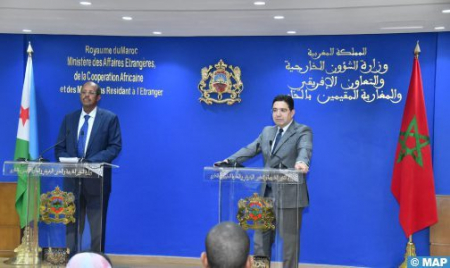Morocco’s FM Deems Lebanon Ceasefire as ‘Positive Development’, Calls For its Respect to Preserve National Unity
Morocco’s Minister of Foreign Affairs, African Cooperation and Moroccan Expatriates Nasser Bourita deemed, Tuesday in Rabat, the ceasefire in Lebanon as a “positive development” that must be respected and enshrined to preserve the country’s unity and territorial security. The announcement of the ceasefire in Lebanon is “a positive development, but it must be respected and enshrined to create the conditions necessary to preserve the unity of this country and the security of its territory,” Bourita said at a joint press conference with his Djiboutian counterpart following their talks. Morocco welcomes all international efforts to establish a ceasefire in Lebanon and put an end to the repeated attacks against the Lebanese territory and people, the Minister added. Bourita deemed as “important” the international initiatives aimed at guaranteeing the stability of Lebanon, calling for respecting the ceasefire after “violations that have unfortunately been noted in its implementation by the parties.” He also voiced the hope that the ceasefire would pave the way for the implementation of the UN Security Council Resolution 1701 on southern Lebanon, stressing the importance of working to strengthen the role of Lebanese national institutions in order to enhance the security and safety of the Lebanese people. “The Kingdom of Morocco, under the leadership of His Majesty King Mohammed VI, supports the territorial integrity of Lebanon and its sovereignty over its territory,” he stressed, asserting that the country’s stability remains essential to ensure its unity and strengthen the security and safety of its people. In this respect, Bourita underscored the need to find a solution to the Palestinian issue, as “the best way to guarantee security and stability in the Middle East.” Strengthening security and stability in the region “can only be achieved through the resolution of the Palestinian issue within the framework of the two-state solution, and the establishment of an independent Palestinian state with Al-Quds East as its capital, on the basis of the 1967 borders,” he concluded.

